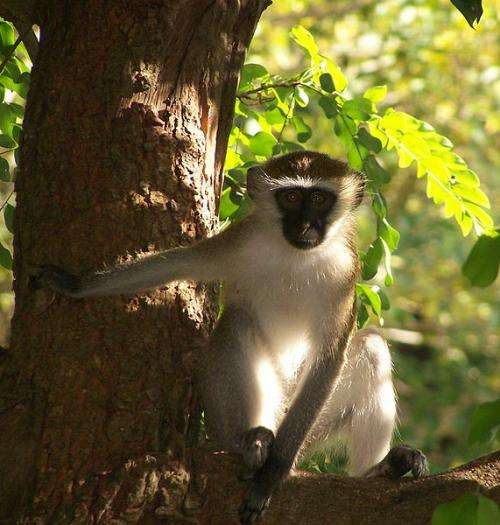Feverish monkeys get kicked when they’re down: New study explores illness and aggression in wild primates

Monkeys suffering from a fever are twice as likely to be the victims of aggression from members of their own social group looking to advance their dominance, according to the first study to monitor fevers in wild primates and reveal the social cost of infection among the species.
Using state-of-the-art miniature data loggers, researchers led by Dr. Richard McFarland from Nottingham Trent University obtained continuous measurements of core body temperature in a group of wild vervet monkeys over a six-year period. They detected 128 fevers in 43 monkeys, totalling 776 fever-days.
Behavior during periods of fever included loss of appetite and fatigue, but the monkeys did not reduce interaction with their social group.
This temporary loss of capacity was detected by other members of the group, offering them competitive opportunities. As well as receiving more aggression, those with a fever were six times more likely to get injured, compared to those without.
Of the 412 days on which a monkey was febrile, 39% involved aggression and 8% resulted in newly acquired injuries. Across all aggressions directed toward victims with a fever, 80% were male and 20% were female—attackers were found to be both male and female regardless of the victim.
When comparing the relative risk of injury to the day on which a fever started, the monkeys were more likely to get injured in the days closer to the onset of a fever, with the maximum probability of injury being two days after the onset of a fever. These results suggest that injuries were more likely when a monkey already had an established fever and were not the cause of the fever itself.
Dr. Richard McFarland, senior lecturer in Psychology at NTU’s School of Social Sciences, has spent almost ten years studying the thermoregulation of primates in South Africa, including the impact of climate on their behavior. He said: “While there are many positives for monkeys who live in social groups—such as protection from predators and improve reproductive success—we’ve demonstrated, for the first time in a wild primate, a hidden cost of sociality.
“These monkeys live in relatively stable dominance hierarchies, but we saw sick animals targeted by their own peers when they were sick, and least able to fight back, potentially improving the attacker’s social status, and further reducing a sick animal’s survival prospects.”
“The results help us to understand disease transmission and the ways in which social structure can change as a result of infection.”
The paper, “Fevers and the social costs of acute infection in wild vervet monkeys,” has been published in the Proceedings of the National Academy of Sciences.
Monkeys are less cuddly with each other when dealing with an infection, study finds
Citation:
Feverish monkeys get kicked when they’re down: New study explores illness and aggression in wild primates (2021, October 22)
retrieved 22 October 2021
from https://phys.org/news/2021-10-feverish-monkeys-theyre-explores-illness.html
This document is subject to copyright. Apart from any fair dealing for the purpose of private study or research, no
part may be reproduced without the written permission. The content is provided for information purposes only.
For all the latest Science News Click Here
For the latest news and updates, follow us on Google News.

